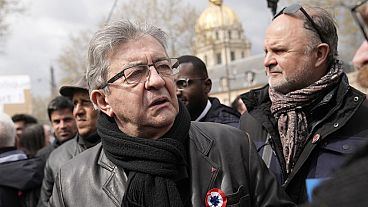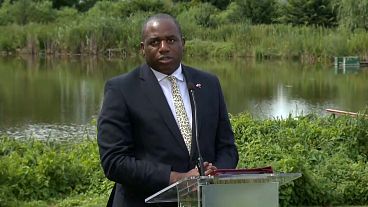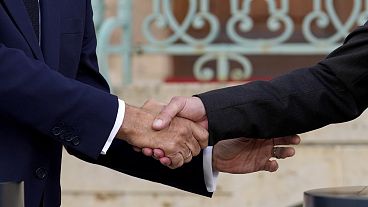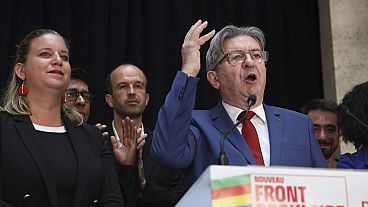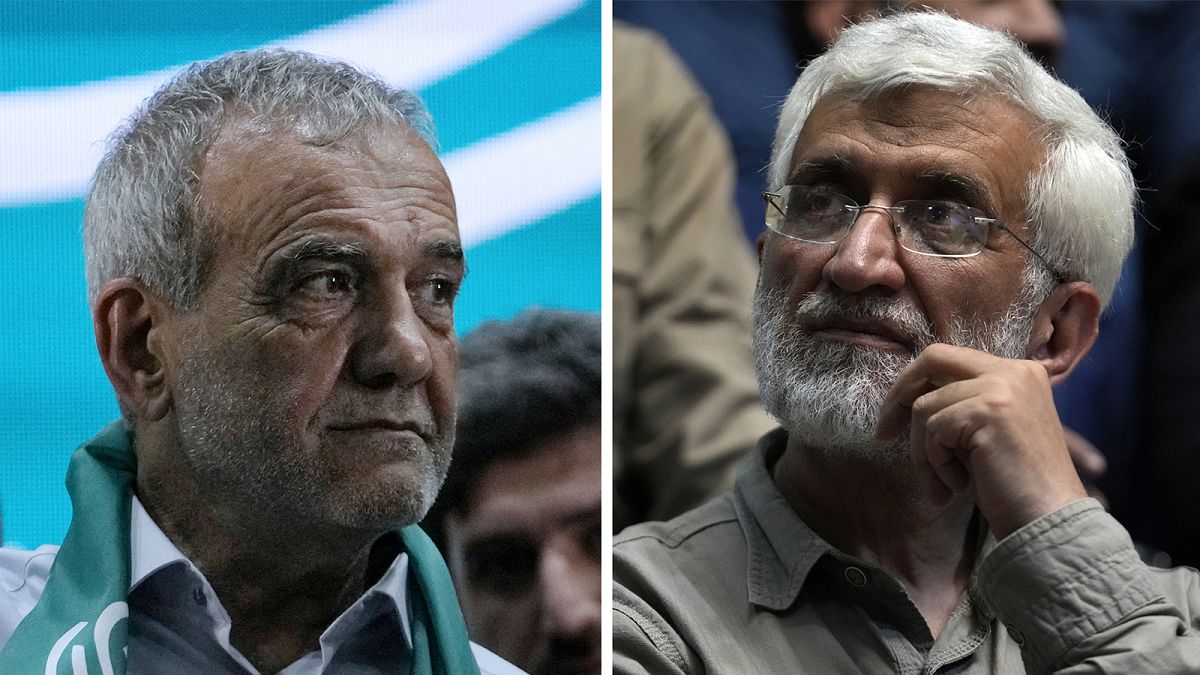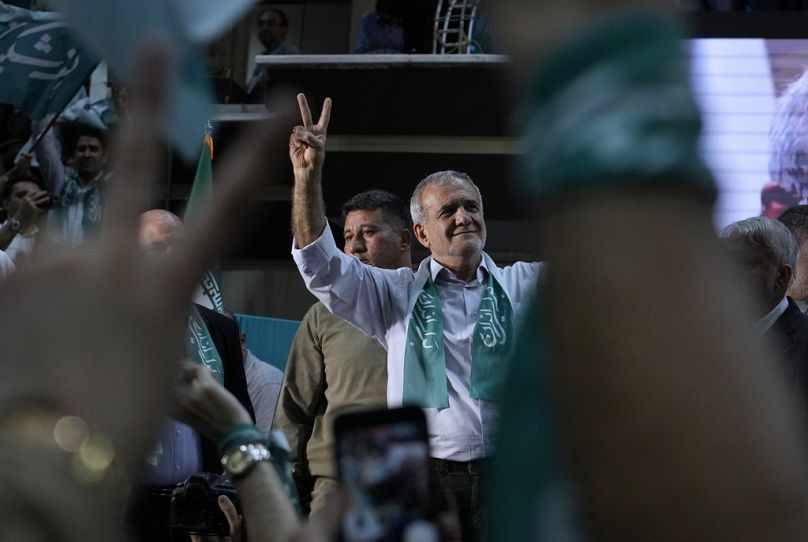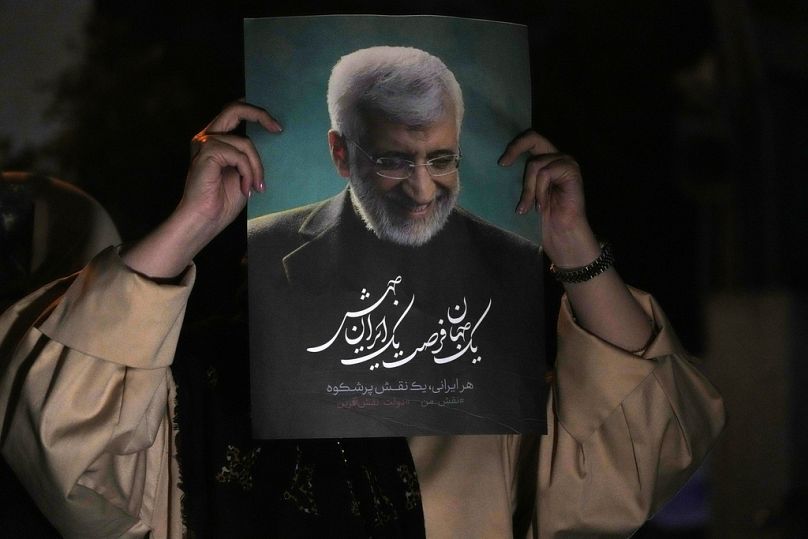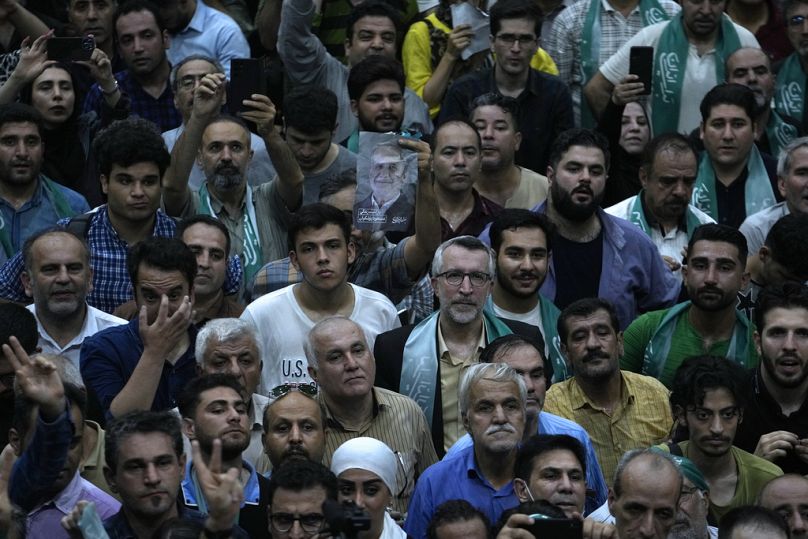As voters go out to elect Iran's new president, Euronews takes a look at the two candidates facing off on Friday and the voters' main concerns.
Iranian voters are about to determine who will be the number one man in their country's executive branch in the second round of elections.
They will elect a new president from candidates close to two rival political factions — little-known reformist Masoud Pezeshkian and Saeed Jalili, a hard-line former nuclear negotiator — to replace the late President Ebrahim Raisi killed in a helicopter crash in May.
The low turnout in the first round and speculations about the voters' final choice have been the key talking points as the runoff is about to show the direction the country will take in the future.
But who are the two candidates facing off on Friday, and what are the voters' main concerns?
Pezeshkian vs Jalili: Key talking points
During his campaign, Pezeshkian aligned himself with other moderate and reformist figures.
His main advocate has been former Foreign Minister Mohammad Javad Zarif, who reached Iran's 2015 nuclear deal with world powers that saw sanctions lifted in exchange for the atomic program being drastically curtailed.
A cardiac surgeon, Pezeshkian said in a televised debate on Tuesday that sanctions imposed by the West have badly hurt Iran's economy. He cited a 40% inflation over the past four years and the increasing poverty rates.
“We live in a society in which many are begging on the streets," he said, adding that his administration would “immediately” work to try to get sanctions lifted and vowed to “repair” the economy.
Pezeshkian's hard-line competitor Jalili, who strongly opposed the 2015 deal, said during Tuesday's debate that the US must honour its commitments on par “with the commitments we fulfilled.” He condemned his opponent for not having any plans for getting sanctions lifted and said he would resume talks about a nuclear deal.
Jalili, who is known as the “Living Martyr” after losing a leg in the 1980s Iran-Iraq war and is famous among Western diplomats for his haranguing lectures and hard-line stances, also pledged to support the country's stock exchange market by providing insurance to stocks as well as financial support to local industries.
He is running for president for the fourth time.
Who does the ayatollah prefer?
Some political analysts believe that Pezeshkian has been the main candidate of the regime in this election since the beginning because Tehran wants to solve some of its crises with the presidency of a moderate reformist.
However, Abbas Abdi, a political analyst who was among the close associates of another reformist, Masoud Pezikian, in this election, told Euronews that the regime did not see him as an outright favourite but rather had to make peace with Pezeshkian as president during the campaign.
"I feel that they have welcomed the choice of Pezeshkian due to the failure of to have a unified policy and other policy changes in Iran. But to say that they have decided to have Pezeshkian as their candidate means that they definitely wanted him to become the president. There is no such thing," he explained.
Meanwhile, journalist Mohsen Sazegara, a well-known opposition figure abroad, is convinced that Ayatollah Ali Khamenei's son Mojtaba — said to be next in line to inherit the title of Iran's supreme leader — has handpicked Jalili since day one.
"Mojtaba Khamenei has promoted Saeed Jalili and the intelligence of IRGC (Islamic Revolutionary Guard Corps) are behind Jalili, and they are even picking ministers for his government," Sazegara told Euronews.
However, Khamenei Sr might not be fully convinced just yet and might need time to warm up to Jalili, Sazegara explained. "The presidency of Jalili is the wish of Mojtaba Khamenei, but the key is in the hands of his father".
What does low turnout say about Tehran's problems?
Both candidates might struggle with low turnout, however. In the first round, just 39.9% of voters went to the polls, while some 4% of the ballots were later rejected, meaning that hundreds of thousands went to void their ballot just to say they voted.
Iranians remain angry over years of poverty due to a faltering economy and severe crackdowns on anything remotely seen as anti-regime, including the large-scale protests over the death of Mahsa Amini in 2022 while in morality police custody.
Tensions with the US and the West over enriched uranium and the ongoing Israel-Hamas war in the neighbourhood that might spill over into an open conflict with Hezbollah in Lebanon all make voters vary about who will be at the helm if things get even worse.
But to some, the reason not to vote hinges on the fact that the president of Iran holds limited power — they are second in command after the ayatollah in every decision-making matter, and although on paper they can choose their own cabinet, not even that is usually the case.
Put simply, in Iran, the president is someone whose main role is often to cater to the whims of the ayatollah and the IRGC, Sazegara said.
"Many of these people say that there is no difference between choosing Pezeshkian and Jalili. This means that this election will not solve our problem," he said.
Instead, the voters want to pick a candidate who will not make things worse himself and who can potentially navigate the system in a way that will make their lives marginally better.
"In my opinion, this pseudo-election was not and is not actually a choice between Jalili and Pezeshkian or any other candidate. This ballot box placed in front of the nation is actually a choice between the will of the nation and Khamenei as the leader and dictator of Iran."
"Khamenei has always emphasised that the people's vote in any election is a vote for the system, and the system means himself," Sazegara concluded.
Meanwhile, Abdi believes going out to vote remains important.
"The fact is that (we're talking about) the future. It is not possible to say with certainty which decision is right and which is wrong," he told Euronews.
"If some people don't vote and Jalili becomes president, we may regret it later and say, 'we wish we had done something to make Pezeshkian president'. In this sense, we cannot say for sure which decision is right."
Could Pezeshkian truly bring reforms to Iran?
A favourite after the first round, Pezeshkian is seen by some as someone who can bring Iran out of the ongoing economic crisis, stop the oppression of women, and promote online freedoms in the country.
Yet, neither Abdi nor Sazegara are optimistic this will turn out to be the case.
"These are very important and serious problems in Iran. Of course, a Pezeshkian government would definitely improve the freedom of the Internet. The pressure on women is likely to decrease," Abdi said. "But I don't think these issues will be resolved quickly."
Sazegara was even harsher in his estimate.
"In my opinion, within the framework of the existing system and the defective and corrupt structure of the Islamic Republic, not even Otto von Bismarck could improve the economic situation of Iran," he said.
"Therefore, as long as this system doesn't change, as long the macro policies of the government don't change, as long as the concentration of power and wealth does not leave the hands of those in power, there is no hope for any reform in any area."
Sazegara believes Pezeshkian knows this, and his campaign promises might end up having a major countereffect, causing Iranians to become even further disillusioned with their leaders.
"Whoever makes a promise of reform knows that it is useless, but in fact a promise to the people is a promise to the people," Sazegara concluded.

